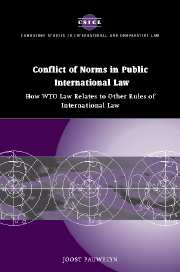 Conflict of Norms in Public International Law
Conflict of Norms in Public International Law Book contents
- Frontmatter
- Contents
- Preface
- Table of cases
- List of abbreviations
- Introduction
- 1 The topic and its importance: conflict of norms in public international law
- 2 The case study: the law of the World Trade Organization
- 3 Hierarchy of sources
- 4 Accumulation and conflict of norms
- 5 Conflict-avoidance techniques
- 6 Resolving ‘inherent normative conflict’
- 7 Resolving ‘conflict in the applicable law’
- 8 Conflict of norms in WTO dispute settlement
- Conclusions
- Bibliography
- Index
- CAMBRIDGE STUDIES IN INTERNATIONAL AND COMPARATIVE LAW
2 - The case study: the law of the World Trade Organization
Published online by Cambridge University Press: 07 July 2009
- Frontmatter
- Contents
- Preface
- Table of cases
- List of abbreviations
- Introduction
- 1 The topic and its importance: conflict of norms in public international law
- 2 The case study: the law of the World Trade Organization
- 3 Hierarchy of sources
- 4 Accumulation and conflict of norms
- 5 Conflict-avoidance techniques
- 6 Resolving ‘inherent normative conflict’
- 7 Resolving ‘conflict in the applicable law’
- 8 Conflict of norms in WTO dispute settlement
- Conclusions
- Bibliography
- Index
- CAMBRIDGE STUDIES IN INTERNATIONAL AND COMPARATIVE LAW
Summary
We can sit down and look at the realistic possibility of making the WTO work for the whole world. We should be realistic. We shouldn't be kidding ourselves that the WTO is all right at the moment. It's not all right.
In this chapter, we make a first attempt to posit WTO law in the wider context of public international law. The sources of WTO law are summed up and some of the special features of WTO law, of particular importance to conflict of norms, are examined.
WTO law as ‘just’ another branch of public international law
For WTO law to be a relevant example in this study on conflict of norms in public international law, it should be established first that WTO law is, indeed, part of public international law.
With one possible exception, no academic author, WTO decision or document disputes that WTO rules are part of the wider corpus of public international law. Like international environmental law and human rights law, WTO law is ‘just’ a branch of public international law. To public international lawyers, my call in the April 2000 issue of the American Journal of International Law for WTO rules to ‘be considered as creating international legal obligations that are part of public international law’ is a truism. As one author noted in response: ‘It is difficult … to envisage any other possible status for rules emanating from a treaty concluded among States under international law, as the WTO Agreement.’
- Type
- Chapter
- Information
- Conflict of Norms in Public International LawHow WTO Law Relates to other Rules of International Law, pp. 25 - 88Publisher: Cambridge University PressPrint publication year: 2003
- 2
- Cited by


